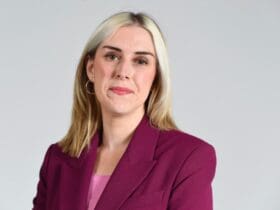While menopause is widely recognised for its disruptions, perimenopause – a period marked by fluctuating hormones – remains less understood. Symptoms like fatigue, brain fog, and a significant decline in libido often leave women feeling unmoored.
At 53, former champion triple jumper Michelle Griffith-Robinson revealed that her menopause journey forced her to tap into her “Olympic mindset,” a drive that helped her confront the emotional and physical strains that threatened to overshadow her identity and impact her marriage.
She shared her experiences candidly with Active Iron, as part of the brand’s World Menopause Awareness Month campaign, discussing not only the hurdles she faced, but also the cultural barriers that many women of colour encounter during this transition.
“I began to notice irregular periods, but what really stood out was that I was beginning to lose my sense of self,” Michelle recalled about her first signs of perimenopause at just 46 years old. “Normally, I’m a very positive and upbeat person, but suddenly I felt heavy, sensitive and overly serious. The pivotal moment came when my periods changed, and I noticed dark bleeding. But even when I visited my doctor they didn’t mention perimenopause; instead, they focused on other issues.”
Her advice to women navigating this journey? “Track everything – your periods and symptoms, but also pay attention to how you’re feeling emotionally, how your moods fluctuate, and even how your relationships are impacted. For me, the realisation hit hard when I lost interest in intimacy with my husband. That wasn’t us, and it prompted me to dig deeper.”
Period tracking apps can be valuable tools for women during perimenopause, providing insights into menstrual changes and associated health concerns like low iron. By tracking both physical and emotional symptoms, women can spot patterns, making it easier to manage and anticipate shifts. This helps build a greater sense of control of their health and wellbeing, helping them to navigate the challenges of the transition with greater confidence.
With scant resources available for Black women when her experience began six years ago, Michelle began her own research. A pre-diabetes diagnosis added another layer, but her determination turned the tide.
Breaking cultural barriers
“My diagnosis journey wasn’t straightforward. In fact, my doctor never mentioned perimenopause; I had to take matters into my own hands and do my own research. I started connecting the dots and realised something wasn’t right, so I had to dig for answers, which can be exhausting for many women, particularly those who may lack confidence,” she explained.
Michelle shared that it helped that the women she was spending time with – other midlife women – were more vocal about their experiences. However, she quickly noticed that most of these conversations were dominated by white, middle-class women.“There were very few Black women talking about menopause at the time, so I had no real reference point for my own journey,” The Menopause Charity ambassador, who is of Afro-Caribbean heritage, explained.
The statistics reveal a troubling truth: a 2022 study found that Black women reach menopause 8.5 months earlier than their white counterparts and experience more severe symptoms, yet are less likely to receive hormone therapy, as well as medical and mental health services.
Michelle highlighted racial disparities, explaining that Black women often face more intense symptoms than their white counterparts, like severe hot flushes, depression, and sleep disturbances, and typically experience menopause around two years earlier than white women.
The average age for a white woman in the UK to enter perimenopause is 51, but this is more likely to be 49 for Black women. So why do fewer women of colour seek the support they need?
The mum-of-three, who live in Wales, said: “Historically, Black women have been taught to keep personal matters private. Growing up, my mum was my hero – she was fantastic. But she was also the ‘just get on with it’ type, because that’s what she knew. And that mindset has been passed down through generations. We’ve seen our mothers and grandmothers simply endure their health challenges without seeking help, a pattern that continues today.”
While women with higher confidence may be more inclined to seek advice and support, Michelle claimed, it’s not always easy. “There are very few Black doctors that come to mind – especially in the media or in the public eye. There are more now, but trust me, six years ago it was very limited,” says Michelle.
Even today, she says there are still trust issues, particularly when it comes to the NHS system where many Black people feel hesitant about seeking help for gynaecological or other health concerns.
“We already know that Black women are more likely to die in childbirth, so there’s a deep-seated mistrust of the healthcare system. Why would someone go to a doctor for menopause when they already feel the system doesn’t have their best interest at heart?” So how do we help build that trust? According to the former GB and Commonwealth athlete, representation is key.
“Representation matters. When you see faces like yours in health discussions, it fosters trust. My role as a 53-year-old perimenopausal woman is to seize opportunities and advocate for change,” Michelle explains. especially as we observe World Menopause Day on October 18.
Despite approximately 13 million women in the UK experiencing perimenopause or menopause, many remain unaware of their symptoms. Michelle’s story serves as a reminder that raising awareness and sharing experiences is crucial to breaking the silence surrounding women’s health.








Leave a Reply
View Comments